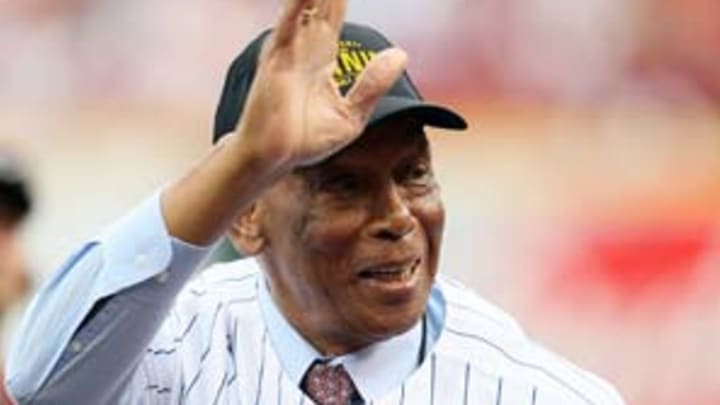Ernie Banks representing Cubs at Gay Pride parade speaks volumes

I am a Chicago Cubs fan.
Not permanently. But for the foreseeable future I will root for the Cubs in the same passionate way I root for BP picketers and a capable Blind Melon tribute band. I want the Cubs to win it all; to dominate the competition; to sell 10 million T-shirts and all the Tom Gorzelanny bobbleheads a guy can hoard. I want the Cubs to be embraced as America's Team because, if we truly live in a courageous and compassionate nation, then the Chicago Cubs are America's Team.
In case you haven't heard, this Sunday the Cubbies will take part in Chicago's Gay Pride Parade. But not merely "take part." For the first time, the team will have its own float -- a vehicle decked out in a brick-and-ivy motif, a la Wrigley Field's outfield wall. In and of itself, the gesture would be a wonderful one; a statement to the Windy City's large gay and lesbian community that they are welcome at 1060 West Addison Street whenever they crave a ballgame.
Here, however, is the capper: Sitting atop the float, waving to the crowd in all its gay-and-lesbian splendor, will be Ernie Banks.
You have read that correctly. Ernie Banks, aka Mr. Cub, will represent the Chicago Cubs at the Gay Pride Parade.
The team could have enlisted any former player without a peep of complaint from the community. Here's Dwight Smith waving to the crowd! Or Ray Burris! Or Mike Maksudian! It could have just sent the float along with Biff, the 19-year-old eager-to-please PR intern. Hell, the Cubs could probably get by merely contributing the float and a box of donuts. But by putting forth Banks, an iconic Hall of Famer and one of the classiest men to ever grace the diamond, the Cubs have made a bold and powerful statement that, even in the oft-closed-minded world of professional team sports (It wasn't all that long ago that White Sox manager Ozzie Guillen referred to a reporter as a "fag." The Sox, by the way, won't be participating in the parade.), homophobia no longer has a place.
Is it the wisest marketing move in a socially conservative part of the country? No, probably not. But sometimes the right thing trumps the savvy thing.
Thankfully, the Cubs are not alone. Appearing alongside Banks will be Brent Sopel, the gritty defenseman who won a Stanley Cup with the Blackhawks before being traded to Atlanta earlier this week. Sopel is a 33-year-old father of three who has never been one for political or social activism. "But everybody is a person," he told the Associated Press, "and we all have feelings."
Specifically, Sopel agreed to take part on behalf of Brendan Burke, the late son of Maple Leafs GM Brian Burke. Brendan died in an automobile accident in February, shortly after publicly coming out of the closet and being embraced by his father. "Anybody who has had to bury a child has suffered a heartbreak and this was the first thing that came to mind," said Sopel, who will have the Cup -- as well as his wife, Kelly -- by his side. "Everything that happened last year with Brendan coming out last year and dying three months later, it was a tragedy."
This is what we should call guts; what we should call heart; what we should call courage and pride. Most professional athletes seem to take great comfort in following the crowd and never stepping out of line to make a statement. They hide behind their Maxims and Xbox 360s. They obscure true feelings with lame clichés, and only speak out when the issue involves their contract or their endorsement deal with Gatorade. What's the ol' football/military mantra? Don't think, just do.
The same, for that matter, goes for organizations. It's easy for franchises to donate $1 million to the local cancer hospital, because a.) It's a noble cause without controversy; b.) The publicity alone covers the lost funds. Could anyone, however, imagine the New York Yankees sending Reggie Jackson or Whitey Ford or (gasp!) Derek Jeter to Manhattan's annual LGBT Pride March? Would the Mets enlist Tom Seaver or Gary Carter for such a cause?
Answer: Of course not. They never have, they likely never will. Too risky. Too, ahem, political. Not all that long ago, LeBron James was asked how he would react to a gay Cav player. His response was telling, predictable -- and sad. ""With teammates you have to be trustworthy, and if you're gay and you're not admitting that you are, then you are not trustworthy," James said. "So that's like the No. 1 thing as teammates -- we all trust each other. You've heard of the in-room, locker room code. What happens in the locker room stays in there. It's a trust factor, honestly. A big trust factor."
In a small regard, James is right. It is about trust. Which is why gay athletes hiding in the closet need to know that, should they summon up the courage to come out, their teammates and coaches will be trustworthy enough to have their backs and respect their sexuality.
Throughout the country, this remains a big question mark.
In Chicago, the questions have, at long last, been answered.
